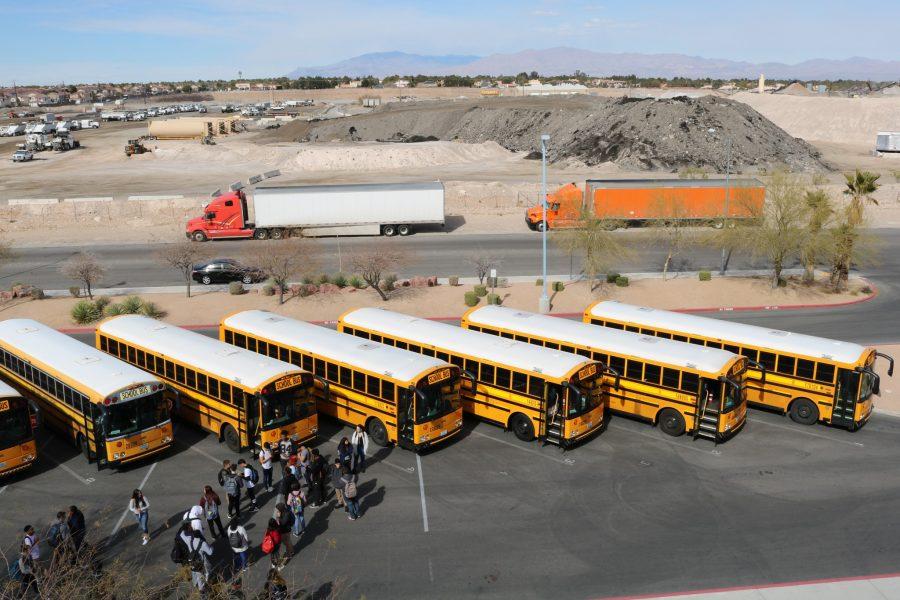The Grizzly community is experiencing air pollution two times higher than the federal standard due to its close proximity to Wells Cargo’s asphalt plant, according to a study conducted by the Clark County School District’s Environmental Services. The plant, only 208 feet from campus, is seeking to expand operations to fulfill the needs of Project Neon, despite health concerns from the school and neighboring community.
In the 2016-17 school year, Spring Valley students experienced 181 allergy and 45 asthma related incidents, according to school nurse Jill Smith. This year, 367 students at Spring Valley were diagnosed with asthma. Many believe the incidents are directly linked to the asphalt pit and the debris it sends on campus.
“Anytime you have students with asthma, anything can trigger it. It could be a chemical; it could be a cologne in a classroom,” Smith said. “It doesn’t necessarily have to be the pit outside, but it could be, and that’s why we don’t want the expansion.”
Exposure to constant dust on campus could lead to symptoms including difficulty breathing, sore throat, eye and ear irritation, and other sinus problems, according to Smith.
On campus, the effects of the asphalt pit across the street are clear. Librarian Darcy Bechtel has to constantly clean in order to keep layers of dust out of the vents and off the walls and flags.
“The fact that the asphalt pit is right next to the school, the amount of dust and dirt that is being blown in the library is constant and quite overwhelming.” Bechtel said. “Some of the flags that have white as a primary color are now discolored. Even the wall behind the flags is supposed to be white, but in certain areas, is black, despite being constantly cleaned.”
In December 2017, the county granted Wells Cargo an air quality permit to expand its operations, but is still waiting for final approval to start building the plant expansion. Principal Tam Larnerd has attended multiple county and school district meetings to oppose the new plant.
“I’m not going to just nod my head and say ‘yes sir’, ‘no sir,’” Larnerd said. “I expect them to listen to the concerns of 2,350 students and the thousands of people who live within a mile of that plant.”
CCSD has taken special interest in Spring Valley’s predicament. CCSD Environmental Services Director Lori Headrick has worked with Larnerd for the past year to measure air quality.
“We (CCSD) appealed the permit (granted to Wells Cargo) because of the uncertainty of the health impacts to the students,” Headrick said.
On February 8, the county did not accept the CCSD’s appeal opposing the asphalt pit expansion. Following this, Larnerd met with District Commissioner Susan Brager to list requests for Wells Cargo to follow such as fixing sidewalks and planting trees to block airborn debris.
To show the potential risk of the issue, Lung-Wen Anthony Chen a, University of Nevada, Las Vegas professor, has been studying the effects of the asphalt pit after a neighboring community contacted him.
After a three-week study, Chen found that there is a risk to the community and the area around the asphalt pit. Even though his findings were conducted over a three-week span, and not recognized by CCSD or the Environmental Protection Agency, they still showed air quality in the area is at alarming levels.
“Based on the data the concentration of dust particles is higher than the average concentration in the valley,” Chen said. “When the wind blows from west to east we do see increase particle concentration. This facility can have some impact on air quality.”
Despite the levels of air pollution, Hendricks study showed that pollution levels are not at the point where and evacuation of the school is necessary, though they can cause breathing problems.
As early as 2016, Wells Cargo has been planning to expand the plant in order to contribute more to Project Neon; the $41 billion dollar expansion to the Spaghetti Bowl.
The project is expected to be done by the summer of 2019. If the permit goes through it would be issued for five years, or whenever Project Neon is complete – whichever comes first.
“Air quality is something that kinda sneaks up on you, the damage is done over a period of time,” Principal Tam Larnerd said. “It would be negligent for myself as the principal and the school district to stand up and say ‘No this needs to change.’ I have to represent and advocate for the students who are already here that are breathing this air.”
Wells Cargo representatives Bill Marion and Trent Scarlet, Vice President of Construction, responded in an email regarding measures they plan to take to ensure safety to the neighboring community.
Wells Cargo said they have installed technology to comply with regulations and ensure the best air quality for the community.
“We work closely with the Clark County Department of Air Quality to comply with applicable regulatory requirements. We incorporate new technology as it emerges to enhance our operation’s environmental compatibility, and we have installed technological advancements to the asphalt pavement mixing facility,” they said in an email signed by both Marion and Scarlet.
Despite updated technology, air quality levels remain above federal standards, according to district tests. The date of new construction for the second plant has yet to be determined.










